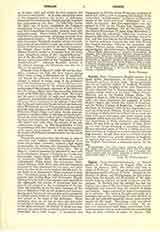

Ingram, JOHN, VENERABLE, English martyr; b. at Stoke Edith, Herefordshire, in 1565; executed at Newcastle-on-Tyne, July 26, 1594. He was probably the son of Anthony Ingram of Wolford, Warwick-shire, by Dorothy, daughter of Sir John Hungerford. He was educated first in Worcestershire, then at the English College, Reims, at the Jesuit College, Pont-a-Mousson, and at the English College, Rome. Ordained at Rome in 1589, he went to Scotland early in 1592, and there frequented the company of Lords Huntly, Angus, and Erroll, the Abbot of Dumfries, and Sir Walter Lindsay of Balgavies. Captured on the Tyne, November 25, 1593, he was imprisoned successively at Berwick, Durham, York, and in the Tower of London, in which place he suffered the severest tortures with great constancy, and wrote twenty Latin epigrams which have survived. Sent north again, he was imprisoned at York, Newcastle, and Durham, where he was tried in the company of John Boste V (v.) and George Swalwell, a converted minister. He was convicted under 27 Eliz. c. 2 (which made the mere presence in England of a priest ordained abroad high treason), though there was no evidence that he had ever exercised any priestly function in England. It appears that some one in Scotland in vain offered the English Government a thousand crowns for his life.
JOHN B. WAINEWRIGHT

